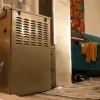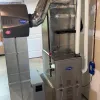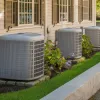If you’re building an addition, adding AC to a garage, or just trying to cool an uncomfortable room, you’re probably considering a mini-split or window unit air conditioner.
Both are able to cool a small space. But which is best for you?
Let’s take a deep dive into the advantages and disadvantages of mini-split heat pumps and window unit air conditioners. First, we’ll look at the key differences between each type of HVAC unit. After that, we will consider the specific pros and cons of each one.
Afterward, you should have all the intel you need to make an informed decision!
Differences between mini-splits and window units
The primary, most visibly apparent difference between a mini split and window unit is that a window unit is a single, compact piece of equipment while a mini-split consists of two main components.
Mini-split basics
The two components are what makes a mini-split system, well, split. It’s split into two parts: an outdoor and indoor unit.
Mini-splits are like smaller versions of a central HVAC system. Hence, they’re referred to as “mini.” Imagine a central heating and cooling system with an outdoor unit and indoor unit, complete with lots of ducts. A mini-split is like a smaller version of that. Plus, it usually doesn’t have ducts.
The mini-split’s outdoor unit consists of a condenser coil and fan. It’s typically installed on the ground outside your home, just like the outdoor unit for a central system. However, the mini-split’s outdoor unit is smaller than what you find with central systems.
The mini-split’s indoor unit mounts to the wall, ceiling, or baseboard level of the area you’re trying to heat and cool. The indoor unit contains the evaporator coil and blower fan.
Window unit basics
A window unit is a single compact piece of equipment. As its name implies, it mounts inside of a window. You have to open the window (and keep it open) to install the unit.
Since these systems are compact, there aren’t any outdoor or indoor units. The indoor part of the window unit is the side that’s accessible from inside your home. The outdoor part hangs out of the window. Condensate from the evaporator coil just drips onto the ground outside.
Note: Most mini-split systems are heat pumps, meaning they can cool and heat the space where they’re installed. Most window units are only air conditioners, although there are some heat pump models available. Most window units that can also heat will only provide inefficient electric resistance heating.
Mini-split-heat pump pros and cons
Here is a rundown of the primary advantages and disadvantages of mini-split heat pumps.
Mini-split pros
- Capacity: Mini splits come in different sizes and capacities, meaning there’s almost always an effective solution for any size space.
- Aesthetics: Unlike window units, mini split systems don’t hang outside a window for the world to see. The outdoor unit can usually be installed in an inconspicuous location behind or next to the home.
- Efficiency: Mini-split systems are the most efficient heat pumps you can buy. Basic models achieve 20 SEER2 and top-tier options are rated at 35 SEER2. All of them are made with variable speed compressors and variable capacity blowers for maximum efficiency.
- Super quiet: You probably won’t hear your mini-split running unless you’re really trying. They’re very quiet most of the time, and only utter a modest whir when running at full capacity.
- Variety: There are ductless mini-splits (most common), ducted options, and mini-split systems for all room sizes, home sizes, and space configurations. They also come in a wide array of efficiency options.
- Reliability: Mini-splits are among the most reliable, long-lasting AC and heating systems you can buy.
- Ability to efficiently cool and heat: Most mini-split systems are heat pumps, meaning they can cool and heat your home using minimal energy.
At the time of publication, mini-split heat pumps are also eligible for massive rebates via Georgia’s energy rebate program. While funds are still available, eligible homeowners can save thousands on a new mini-split heat pump system!
Mini-split cons
- Upfront costs: Compared to window units, mini-split equipment is more expensive. In most cases, you will also need a contractor to install the system, which adds to the cost. At present, these costs are significantly lower for our customers thanks to energy rebates for mini-split systems!
- Installation complexity: Mini-split systems require more complicated installation procedures. With a window unit, you just open the window, set it inside, and plug it in.
- Lack of portability: A mini-split system is, for all intents and purposes, a permanent mechanical system you add to your home. This might not be a “con,” per se, but it’s worth noting that you can’t take it with you if you move. If you want to take a window unit with you to a new home, you can.
Window unit pros and cons
These are the main advantages and disadvantages of window unit air conditioners.
Window unit pros
- Low upfront costs: Window units are widely available and can usually be purchased for less than $1K at hardware or appliance stores.
- Simple installation: Anybody strong enough to handle the window unit can install it. You just open the window, place it in the opening, and plug it in.
- Portability: If you move to a new home, you can take the window unit with you.
Window unit cons
- Less capacity: While window unit ACs come in a variety of capacities, they typically can’t cool areas as large as mini-split heat pumps can. They also lack options for multiple rooms or zones. In most cases, the window unit is only good for cooling the room where the window is.
- Aesthetics: Many people find window units to be unsightly. Since they hang out of a window, you can’t really hide them. This often leads to…
- Community restrictions: Some communities or HOAs might restrict the use of window unit ACs due to their less-than-appealling aesthetics.
- Low efficiency: Window units aren’t very efficient compared to other air conditioning options. Plus, they create air leakage around the window edges anywhere you install one. This is the tradeoff for the lower upfront cost of these units: a higher electric bill.
- Noisy: If you’ve ever used one of these, you know how loud they are. Newer models are quieter than old ones, but they’re nowhere near as whisper-soft as a mini-split system.
- Less reliable: On the whole, window unit air conditioners don’t last as long as mini-split systems.
- Lack of efficient heating: While some window unit units also provide heating, it’s usually inefficient resistance heating. This kind of heating will increase your electric bill quite a lot during the winter. Some window units are true heat pumps that provide more efficient heating, but they’re not common.
- Reduced safety: With a window unit, you basically have a window that’s open 24/7, making it easy for somebody to enter your home.
Conclusion: Mini-split beats window unit AC in nearly every category
From efficiency and noise levels to longevity and aesthetics, a mini-split is the preferred choice compared to a window unit air conditioner.
It really only makes sense to get a window unit when you:
- have a tiny budget for an air conditioner
- don’t need the unit to provide heating
- want to take it with you when you move
- only need temporary AC, such as during (but not after) a renovation
If you’re considering a mini-split heat pump system for your Atlanta area home, PV Heating, Cooling & Plumbing can help!
We’re certified Carrier Ductless contractors, plus we’re an approved contractor for the Georgia energy rebate programs that help homeowners save thousands on mini-split systems!
Give us a call today at (404) 798-9672 or schedule service online!





